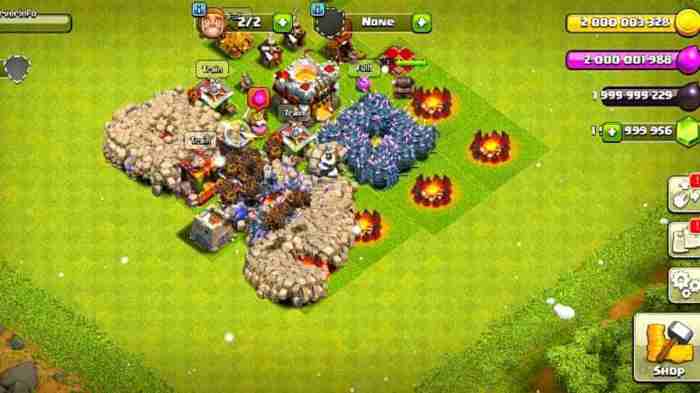Clash of Clans, the globally renowned strategy game, operates on a robust and intricate server infrastructure that forms the backbone of its thrilling gameplay. This article takes you on an in-depth journey into the Clash of Clans servers, exploring their architecture, performance optimization techniques, security measures, scalability strategies, and more.
Get ready to uncover the secrets behind the scenes that make this game a captivating experience for millions of players worldwide.
Clash of Clans servers employ a distributed architecture, ensuring optimal performance and reliability. Game servers, database servers, and matchmaking servers work in harmony to provide a seamless gaming experience. Metrics such as CPU utilization and network latency are closely monitored to maintain peak server performance, while load balancing and caching techniques enhance efficiency.
Clash of Clans Server Architecture

Clash of Clans utilizes a distributed server architecture to handle the vast number of players and game instances simultaneously. This architecture consists of various types of servers, each serving a specific purpose:
- Game Servers:Responsible for hosting game sessions and managing player interactions within a village.
- Database Servers:Store player data, village information, and other game-related information.
- Matchmaking Servers:Pair players together for battles based on their village levels and preferences.
These servers are interconnected and communicate with each other through secure channels to ensure seamless gameplay and data synchronization.
Server Load and Performance

Monitoring server load and performance is crucial to ensure a smooth gaming experience. Metrics such as CPU utilization, memory usage, and network latency are commonly used to assess server performance.
Regular monitoring and analysis of performance data allow administrators to identify potential bottlenecks and implement optimizations to improve server responsiveness.
- Load Balancing:Distributes player traffic across multiple servers to prevent overloading.
- Caching:Stores frequently accessed data in memory to reduce database queries and improve performance.
- Database Indexing:Optimizes database queries by creating indexes on frequently used fields.
Server Maintenance and Updates

Regular server maintenance and updates are essential to ensure the stability and security of Clash of Clans servers. These processes involve:
- Scheduled Maintenance:Planned downtime to perform server upgrades, maintenance tasks, and security patches.
- Unscheduled Maintenance:Unplanned downtime to address critical issues or security breaches.
- Backups and Disaster Recovery:Regular backups and disaster recovery plans ensure data integrity and minimize downtime in case of server failures.
Minimizing downtime during maintenance and updates is achieved through careful planning, communication with players, and the use of automated tools.
Server Security: Clash Of Clans Servers

Protecting Clash of Clans servers from security threats is crucial to safeguard player data and ensure game integrity.
- Firewalls:Restrict unauthorized access to servers by filtering network traffic.
- Intrusion Detection Systems (IDS):Monitor server activity for suspicious behavior and alert administrators.
- Encryption:Protects data in transit and at rest from unauthorized access.
Regular security audits, monitoring, and incident response plans help maintain server security and minimize the impact of potential threats.
Server Scalability and Capacity Planning
Server scalability is essential to handle the growing number of players and game events in Clash of Clans. Factors affecting scalability include:
- Number of Players:As the player base grows, more servers are required to handle the increased load.
- Game Events:Special events and updates can lead to spikes in player activity, requiring temporary server scaling.
Scaling techniques include:
- Horizontal Scaling:Adding more servers to distribute the load across multiple machines.
- Vertical Scaling:Upgrading existing servers with more powerful hardware.
Capacity planning involves forecasting future server needs and implementing appropriate scaling strategies to ensure a seamless gaming experience for players.
Essential Questionnaire
What is the purpose of Clash of Clans servers?
Clash of Clans servers provide the infrastructure for the game’s online multiplayer functionality, facilitating communication between players, managing game data, and ensuring a smooth and stable gaming experience.
How are Clash of Clans servers secured?
Clash of Clans servers employ various security measures, including firewalls, intrusion detection systems, and encryption, to protect against unauthorized access, data breaches, and DDoS attacks.
What factors affect Clash of Clans server performance?
Factors such as the number of players, game events, and server load can impact Clash of Clans server performance. Regular monitoring and optimization techniques are employed to maintain optimal performance.
